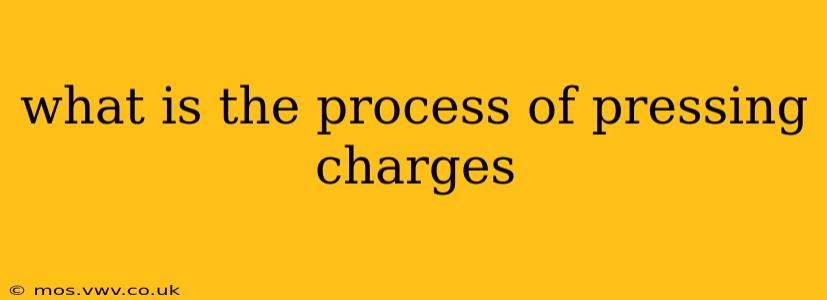Pressing charges, the formal process of initiating a criminal case against someone, can seem daunting and complex. The specifics vary significantly depending on the jurisdiction (country, state, or even local area), the severity of the crime, and the evidence available. However, the general process involves several key steps. This guide provides a broad overview; it's crucial to consult with legal counsel for advice specific to your situation.
What Happens After a Crime is Committed?
The first step isn't necessarily "pressing charges," but rather reporting the crime. This often involves contacting law enforcement—the police or sheriff's department—to file a police report. The police will investigate the incident, gathering evidence, interviewing witnesses, and potentially apprehending the suspect. The quality of the police investigation significantly impacts the ability to press charges successfully.
Who Decides Whether to Press Charges?
This depends on the jurisdiction and the type of crime. In some cases, particularly for less serious offenses, the victim can decide whether to pursue charges. This is often referred to as a "private prosecution," though it's less common in practice. However, for most felonies and many misdemeanors, the decision to press charges rests primarily with the prosecutor or district attorney. The police investigation provides the prosecutor with the necessary information to assess the strength of the case.
H2: What Factors Do Prosecutors Consider?
Prosecutors assess several factors before deciding to file charges. These include:
- Sufficiency of Evidence: Is there enough credible evidence to prove guilt beyond a reasonable doubt?
- Strength of Witnesses: Are witnesses reliable and credible? Will they testify in court?
- Feasibility of Prosecution: Is there a realistic chance of winning the case? This considers factors like the availability of evidence and witness cooperation.
- Public Interest: Does prosecuting this case serve the public interest? This is a broader consideration encompassing factors like community safety and resource allocation.
If the prosecutor decides there isn't enough evidence or the case is unlikely to succeed, they may decline to press charges. This doesn't mean the victim can't pursue other legal avenues, such as civil lawsuits.
What is the Role of the Victim in Pressing Charges?
Even if the prosecutor ultimately decides whether to pursue a case, the victim plays a critical role. The victim's statement is essential evidence, and their willingness to cooperate with the investigation and testify in court is often crucial for a successful prosecution. The victim may also be asked to provide additional information or evidence to support the case.
What Happens After Charges are Pressed?
Once charges are filed, the legal process officially begins. This includes:
- Arraignment: The accused is formally notified of the charges and enters a plea (guilty, not guilty, or no contest).
- Discovery: Both sides exchange evidence and information.
- Pre-Trial Motions: Both sides may file motions to suppress evidence, dismiss charges, or resolve other legal issues.
- Trial (if necessary): If the case isn't resolved through plea bargaining, it proceeds to trial.
Can Charges be Dropped After They Are Filed?
Yes, charges can be dropped at various stages of the process. This might occur due to insufficient evidence, witness unavailability, prosecutorial discretion, or a plea bargain.
What if I am the Victim of a Crime and Want to Press Charges?
If you're a victim of a crime, your first step should be to report the crime to the police and cooperate fully with their investigation. You should also consult with an attorney to discuss your legal options and understand your rights.
This information is for general knowledge and should not be considered legal advice. Always consult with a qualified legal professional for guidance on specific legal matters.
